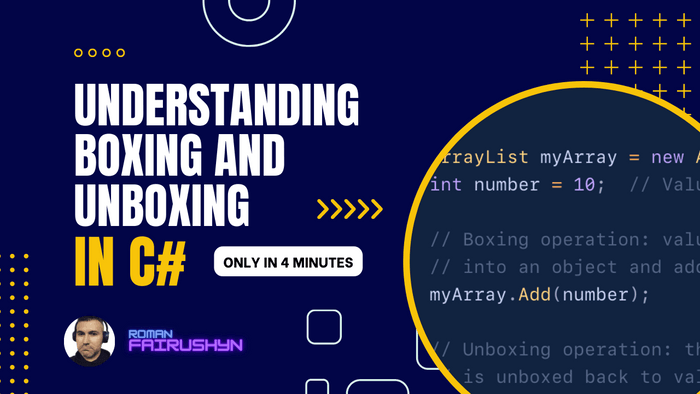Understanding Boxing and Unboxing in C#
4 min read · — #csharp-interview#junior
As a software developer, mastering programming languages such as C# is an essential step in preparing for technical interviews. But the interviewers don't just want to know if you can write C# code. They want to see your understanding of the core concepts, such as memory management, type conversions, and more. Today, we're going to delve into two fundamental, yet often misunderstood, aspects of C#: Boxing and Unboxing.
Whether you're a beginner learning C# for the first time or an experienced developer seeking to refresh your understanding of these topics, this post will provide a clear explanation of what boxing and unboxing are, their significance, and the potential performance implications. By the end, you'll be equipped with the knowledge to confidently explain and demonstrate these concepts in your next technical interview. So, let's get started!
What is Boxing?
Boxing is the process of converting a value type into a reference type. In the .NET framework, all the value types are derived from the System.ValueType, which in turn is derived from System.Object. Hence, it's possible to convert value types to object type (which is a reference type). This process is known as Boxing.
Here's an example:
int value = 123; // Value type.
object boxed = value; // Boxing.In this example, an integer value is converted into an object type. This operation creates a new object on the heap and copies the value into this new object. It's an implicit conversion. The value type is boxed into a reference type.
What is Unboxing?
Unboxing is the reverse of boxing, i.e., converting a reference type into a value type. This is an explicit conversion and requires type casting. The boxed object can be unboxed, and the value can be assigned to a value type.
Here's an example:
object boxed = 123; // Boxing.
int unboxed = (int)boxed; // Unboxing.Here, we first box an integer value, and then unbox it back to an integer. Note that unboxing needs to be done to the correct type. If the type does not match, the .NET runtime throws an InvalidCastException.
Boxing and unboxing are computationally expensive processes. Boxing involves heap allocation and the value type's value copy. Unboxing involves type checking and value copy. They also lead to more garbage collection overhead, as every boxed object needs to be cleaned up later.
Here's another example with a bit more complexity:
ArrayList myArray = new ArrayList(); // ArrayList stores objects.
int number = 10; // Value type.
// Boxing operation: value type 'number' is boxed
// into an object and added to the ArrayList.
myArray.Add(number);
// Unboxing operation: the boxed object in the ArrayList
// is unboxed back to value type.
int retrievedNumber = (int)myArray[0];In this case, we add a value type to an ArrayList, which can only hold objects (hence a boxing operation happens). Later we retrieve the value and unbox it back to an integer.
Understanding boxing and unboxing is important, not only for your interview but also for writing efficient C# code. They can cause performance issues if not used properly, so it's generally best to avoid them when possible.
Boxing and Unboxing Performance Considerations
One might wonder, if boxing and unboxing are such fundamental operations in C#, why we might need to be cautious about their usage. The answer lies in understanding the .NET CLR's (Common Language Runtime) memory management.
In .NET, memory is divided into two main regions: the stack and the heap. Value types reside on the stack, and reference types (objects) live on the heap. The stack is generally faster to allocate and deallocate memory from, while the heap is slower.
Boxing is an expensive operation because it involves:
- Allocating memory on the heap.
- Copying the value from the stack to the newly allocated heap memory.
And unboxing is costly because it involves:
- Type checking at runtime to ensure the correct type is being unboxed.
- Copying the value from the heap back to the stack.
Therefore, frequent boxing and unboxing can lead to performance issues due to increased memory usage on the heap, which leads to more frequent and longer garbage collection pauses. Additionally, the constant copying of values back and forth between the stack and the heap can slow down your program.
Here's an example to illustrate this:
ArrayList arrayList = new ArrayList(); // ArrayList stores objects.
for (int i = 0; i < 1000000; i++)
{
arrayList.Add(i); // Boxing occurs here.
}
int sum = 0;
for (int i = 0; i < 1000000; i++)
{
sum += (int)arrayList[i]; // Unboxing occurs here.
}In this example, a million boxing operations occur when the integers are added to the ArrayList. And when calculating
the sum, a million unboxing operations occur. This could lead to a significant performance hit.
As a best practice, avoid unnecessary boxing and unboxing. For instance, use generic collections like List<int> instead
of ArrayList, as they do not require boxing and unboxing of the stored value types.
Knowledge of such performance implications is not only valuable for your coding and design decisions, but it also displays a deeper understanding of the language during technical interviews.
